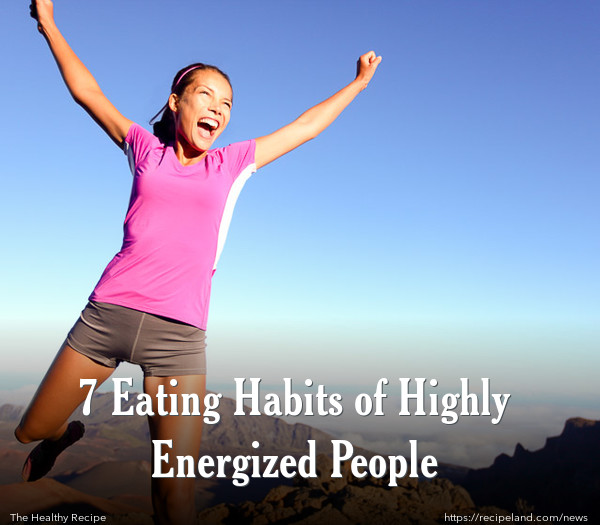It is not terribly difficult to stick to a healthy diet. Choosing foods that help boost your energy requires some balance and moderation, and also a good amount of variety. When you include these factors in your food choices, you will get plenty of macro and micronutrients, control your portion sizes, keep calories in check, and enjoy numerous foods from each food group.
No one special diet is known to truly give you great energy. Some experts claim that the Mediterranean diet may come closest, so consider those guidelines if you need more energy.
Here are 7 rules that people who are more energized seem to follow. Try these and see if your mid-afternoon slump disappears:
1. Never skip breakfast.
People who are the most energized would always begin their day by waking up their bodies with a healthy breakfast. When you get your metabolism going right away, your brain gets the message that it is time to wake up. You don’t have to have a large breakfast, and it does not necessarily have to be the second you jump out of bed. But, it should contain a balance of carbs and lean protein. Try a slice of whole grain toast with almond butter, or a small bowl of whole grain cereal and low fat milk. For those who might be more active or more hungry, try a bowl of quinoa with avocado and a poached egg, or a large bowl of oatmeal with bananas, raisins, walnuts and cinnamon. If you never feel ready or hungry for breakfast, you probably ate too much or too late the night before—not a good habit if you want to stay energized!
2. Eat regularly throughout the day.
If you want more energy, you must fuel your body properly throughout the day. This means no skipping meals, and no junky snacks. You should be putting healthy foods into your body every 3-5 hours during the day. You can either eat 3 regular meals and a couple of small snacks, or 5 smaller meals spaced evenly through the day. Both patterns keep your blood sugar well balanced and help prevent those energy slumps you are trying to avoid.
3. Eat “real” food as much as possible.
When you stick to whole foods instead of processed foods, each bite and each calorie comes with more nutrients. When the source of the food can be identified, you will receive much more benefit. Avoid refined breads and baked goods, fried and fatty foods, and processed foods, which all provide plenty of calories with little nutrients.
4. Choose colourful foods.
Make sure that your plate contains a wide variety of colours. Fruits and vegetables like strawberries, tomatoes, sweet potatoes, carrots, yellow squash, oranges, kiwi, kale, broccoli, peppers, eggplant, blueberries, leafy greens and more are filled with a variety of antioxidants which help to neutralize damaging free radicals in your system. Free radicals are molecules that can damage cells and make them vulnerable to a variety of illnesses. Consuming antioxidants helps to fight against this process, and helps boost your energy.
5. Eat enough omega-3 fatty acids.
Omega-3 fatty acids are found in fatty fish, like salmon, halibut, tuna, lake trout, sardines, and anchovies, and can also be found in flaxseeds, walnuts, canola oil and certain fortified foods. Omega-3 fatty acids can help reduce inflammation in the body and improve the function of the cells. Brain function can also be improved. Consuming omega-3 fatty acids regularly helps give you more energy, too.
6. Allow yourself to snack.
When you have healthy snacks in between meals, it can help keep your energy levels balanced and also help keep your mood stable. You can fill in any gaps you might be missing for certain nutrients, and keep your metabolism running strong. Make sure your snacks are nutrient rich and high quality. Choose complex carbs and lean proteins with healthy fats. These are digested more slowly by the body, keeping blood sugar levels more steady. Try hummus and baby carrots, snap peas, low fat Greek yoghurt with blueberries, whole grain crackers with almond or peanut butter, or nuts and dried fruit.
7. Drink tons of water.
Humans cannot store water, so it is very important that you keep the supply steady and replenish your levels. Breathing, sweating, urinating and other bodily functions can cause us to lose water quickly. Many people are constantly dehydrated and do not even know it. dehydration can lead to fatigue, headaches, lost focus, and mood swings. Drink plenty of water to stay properly hydrated and keep your energy levels more steady.
Having enough energy to get through the day feeling strong is important to your overall health and well being. Try these suggestions to boost your energy!










Comments